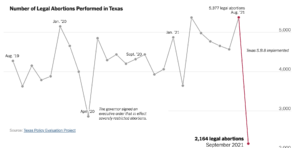Researchers have found that the newly enacted Texas Heartbeat Bill has cut the number of abortions performed in the state by 50% compared to the same time in 2020.
It was joyful news for pro-life supporters when, come September 1, 2021, Texas’ new law SB8 took effect. The bill, known as a heartbeat bill, prohibits abortions in the state after a preborn baby’s heartbeat can be detected, which usually occurs around six weeks gestation.
The Lone Star state became the first state to successfully prohibit abortions pre-viability since the U.S. Supreme Court decided Roe v. Wade in 1973.
Many had expected the high court to step in and block the implementation of SB8 – but on September 2, the Supreme Court ruled 5-4 to allow the law to remain in effect while SB8 is considered by the courts.
As a result, according to researchers at the University of Texas at Austin, abortionists performed 2,164 abortions in Texas in September 2021 compared to 4,313 in September 2020 – a 50% year-over-year decline.

Photo Credit: The New York Times
Now, The New York Times notes that previous research had found that 84% of women seeking abortions in Texas were over six weeks pregnant. So, after SB8 took effect, one could reasonably expect an 84% decline in abortions.
So why have abortions only declined by 50% – at least according to the University of Texas at Austin study?
The Times offers several different possible factors to explain the disparity.
First, it seems that abortion providers can see patients more quickly, since no abortions are being performed past six weeks. Doctors are also apparently working longer hours, at least for now.
Second, The Times speculates that “women who were worried about being unable to get an abortion because of the law might have sought care earlier than they otherwise would have.”
Additionally, authors of the study muse that “increases in financial donations following passage of SB8 may have helped patients living on low incomes to cover the cost of their abortion (about $650), which they otherwise may have delayed until they could secure enough money.”
However, the disparity between the percent of abortions that were being performed on babies older than six weeks and the year-over-year decline has one led researcher to believe that the 50% reduction is just the beginning.
“It’s one data point in a further downward slide,” Kari White, the project’s lead investigator, said of the September numbers. “I would expect we’ll see the number decrease in subsequent months.”
The study concludes, “The number of abortions provided at in-state facilities may decrease further the longer SB8 remains in effect.”
John Seago, the legislative director of Texas Right to Life, told The Times, “The last two months have been a phenomenal success for the pro-life movement. We are the first state to be able to enforce a heartbeat bill, and lives are being saved every day because of this work.”
In just a few days, on Monday, November 1, the U.S. Supreme Court will hear back-to-back arguments involving the Texas Heartbeat Act.
In the first case, Whole Woman’s Health v. Jackson, the court will consider whether “a state can insulate from federal-court review a law that prohibits the exercise of a constitutional right by delegating to the general public the authority to enforce that prohibition through civil actions.”
This question gets to the heart of Texas’ Heartbeat Act, which so far has survived because of a novel legal innovation. SB8 grants citizens the right to sue abortionists for performing abortions – whereas normally, that job would fall to state officials. In this case, the court will consider whether a state can do that.
In the second case, United States v. Texas, the high court will consider the following question: “May the United States bring suit in federal court and obtain injunctive or declaratory relief against the State, state court judges, state court clerks, other state officials, or all private parties to prohibit S.B. 8 from being enforced.”
After SB8 took effect, the U.S. Department of Justice sued Texas for violating the supposed constitutional right of women to obtain abortions. In this case, the Supreme Court will consider whether the federal government can bring this kind of lawsuit against a state in a federal court.
Please pray for wisdom for the nine Supreme Court justices in these two cases. And pray for a continued decrease in the number of abortions taking place in Texas – that those women considering abortion may choose life for their baby.
Related articles:
Pro-Life Supporters Hail First Day of ‘Historic’ Texas Heartbeat Law
Supreme Court Declines Abortionists’ Emergency Plea to Block Texas Heartbeat Law
Photo from Shutterstock.






